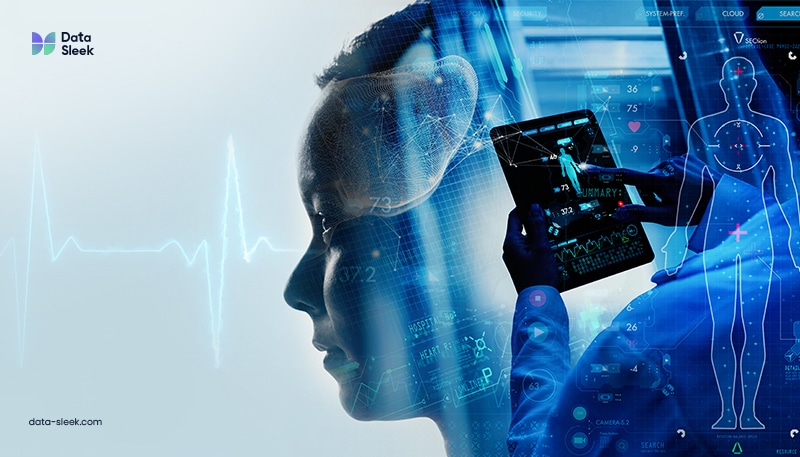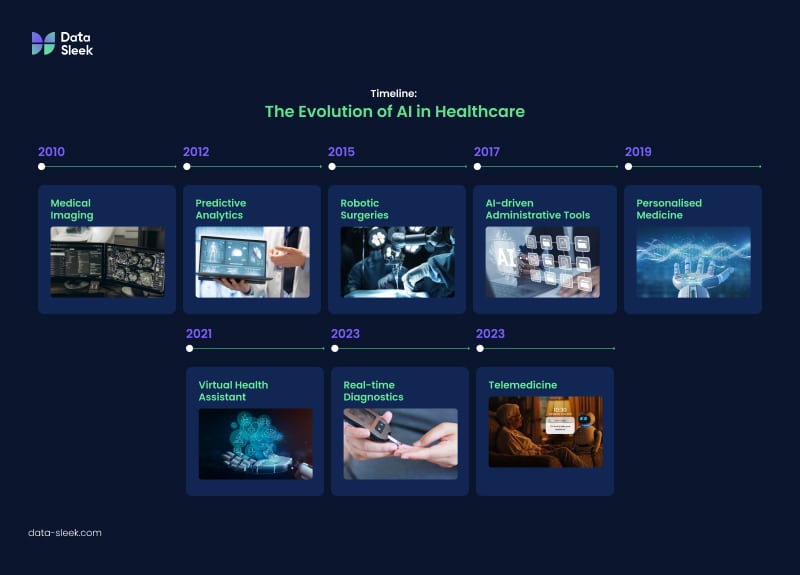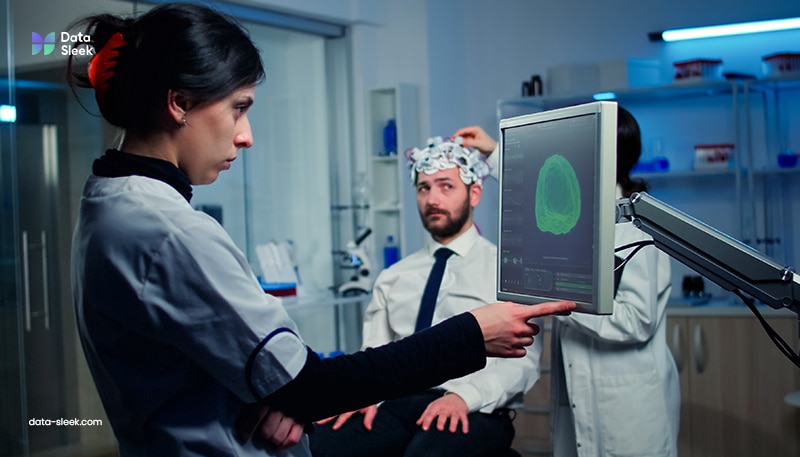Key Highlights
- AI-driven healthcare solutions are revolutionizing patient care by enhancing diagnostic accuracy, personalizing treatments, and improving patient outcomes.
- The integration of AI in various healthcare sectors, such as diagnostics, personalized medicine, mental health, surgical procedures, and hospital management, is reshaping the industry.
- AI technologies like machine learning, deep learning, and predictive analytics are being used to develop innovative healthcare solutions that cater to individual patient needs.
- Virtual health assistants, chatbots, robotics in surgery, and predictive analysis are some AI-powered tools transforming how healthcare is delivered and managed.
- Overcoming challenges in AI adoption involves addressing ethical considerations, ensuring data privacy and security, and augmenting healthcare professionals’ capabilities through training and education.
- The future of AI in healthcare holds promising advancements in emerging technologies, patient safety, cost-effective quality care, and continuous innovation in the healthcare landscape.

Introduction
Artificial intelligence (AI) is revolutionizing healthcare, driving innovative solutions that enhance patient care delivery and outcomes. By leveraging AI technologies such as machine learning, natural language processing, and predictive analytics, healthcare professionals can optimize clinical workflows, improve disease diagnosis accuracy, and personalize treatment options. From streamlining administrative tasks to advancing drug discovery, the impact of AI-driven healthcare solutions is reshaping the industry landscape. This blog explores the evolution, application, and future trends of AI in healthcare, highlighting its transformative potential across various healthcare domains.
The Evolution of AI in Healthcare

Artificial intelligence (AI) has catalyzed a transformative journey in healthcare. From its inception to present-day applications, AI’s evolution in healthcare has been revolutionary. Tracing back to the early stages, AI’s integration in medicine traces its roots to the development process of machine learning algorithms. Milestones in AI development for healthcare have reshaped patient care, paving the way for advanced diagnostics and treatment options. As AI advances, its impact on healthcare professionals and patient outcomes becomes increasingly evident, signifying a promising future for AI-driven healthcare solutions.
Tracing the Origins of AI in Medicine
The roots of AI in medicine stretch back to the initial applications of computer programs for medical data analysis. Early-stage projects focused on interpreting health records and medical information, gradually evolving to encompass clinical data and image analysis. As computer science advanced, AI technology integrated neural networks and machine learning algorithms, propelling the development of innovative healthcare systems. Research in AI’s application within healthcare has led to groundbreaking advancements, shaping the trajectory of modern medical practice. The journey of AI in medicine highlights a transformative evolution towards enhanced patient care and diagnostic precision.
Milestones in AI Development for Healthcare
Advancements in AI for healthcare have marked significant milestones. The journey has been transformative from early applications in health records management to the current integration of machine learning in clinical workflows. Breakthroughs in medical image analysis, predictive analytics for disease diagnosis, and personalized treatment options showcase the potential of AI in improving patient outcomes. The convergence of natural language processing and data analytics has revolutionized how healthcare professionals access and interpret patient data. These milestones underscore the crucial role of AI technology in enhancing healthcare delivery.
How AI is Transforming Patient Diagnostics

AI is revolutionizing patient diagnostics by enhancing accuracy and efficiency. Machine learning algorithms analyze medical images, aiding in early disease detection. Predictive analytics sift through vast patient data, predicting health risks before symptoms manifest. This technology empowers healthcare providers to diagnose conditions swiftly and accurately, leading to improved patient outcomes. By leveraging AI in diagnostics, healthcare systems can offer precision medicine tailored to individual needs, marking a significant advancement in patient care.
Enhancing Imaging Accuracy with Machine Learning
By harnessing the power of machine learning, healthcare providers can significantly enhance the accuracy of medical imaging interpretations, especially in radiology. Machine learning algorithms can precisely analyze vast amounts of imaging data, aiding in the early detection and accurate diagnosis of various conditions. These advancements improve patient outcomes by providing healthcare professionals with valuable insights into diseases at a level of detail previously unattainable. Additionally, the integration of machine learning in imaging processes streamlines workflow efficiency and ultimately elevates the standard of care provided to patients.
Predictive Analytics in Early Disease Detection
With predictive analytics, AI in healthcare can forecast potential health issues in patients at the early stages. By analyzing patient data and health records, AI tools can identify patterns that indicate the likelihood of developing certain diseases. This proactive approach allows for timely interventions and preventive measures to be implemented, significantly improving patient outcomes. Through machine learning algorithms, healthcare providers can detect diseases such as cancer or diabetes before symptoms manifest, leading to more effective treatment strategies.
AI’s Role in Personalized Medicine

Tailoring treatments in personalized medicine involves leveraging AI for genomic data analysis to match patients with the most effective therapies. AI-driven models offer customized drug regimens, optimizing treatment outcomes. By analyzing individual genetic profiles, healthcare providers can offer precise interventions, minimizing adverse effects and enhancing patient responses. This tailored approach aligns treatment options with patients’ unique genetic makeup, ushering in a new era of precision medicine that revolutionizes healthcare delivery. AI’s prowess in personalized medicine signifies a shift towards patient-centric care and improved therapeutic strategies.
Tailoring Treatments through Genomic Data Analysis
By leveraging genomic data analysis, AI-driven healthcare solutions revolutionize treatment personalization. The intricate analysis of an individual’s genetic makeup allows for tailored therapeutic approaches, significantly improving patient outcomes. Identifying genetic variations enables healthcare providers to prescribe medication and therapies that are precisely suited to each patient’s unique genetic composition, leading to more effective and targeted treatments. This personalized approach not only enhances treatment efficacy but also minimizes adverse reactions, marking a significant advancement in the delivery of precision medicine.
AI-Driven Models for Customized Drug Therapies
Innovative AI-driven models are revolutionizing the realm of customized drug therapies. By leveraging advanced algorithms and data analytics, these models tailor treatment plans based on individual patient data, genetic information, and treatment responses. This personalized approach enhances the efficacy of drug therapies, minimizes adverse effects, and improves patient outcomes. Through the application of AI in drug discovery and development processes, healthcare providers can now offer bespoke treatment options that address specific patient needs with enhanced precision and effectiveness.
Revolutionizing Patient Care with AI

In healthcare, AI is revolutionizing patient care by enhancing engagement and support systems. Virtual health assistants provide round-the-clock assistance, improving patient interactions and outcomes. Automated monitoring ensures timely interventions, leading to proactive care management. These AI-driven solutions streamline healthcare workflows, optimizing resource allocation and quality of care. By leveraging AI technology, patient care becomes more personalized, efficient, and effective, ultimately transforming the healthcare landscape towards better patient experiences and improved overall outcomes.
Virtual Health Assistants and Their Impact on Patient Engagement
Virtual health assistants play a crucial role in enhancing patient engagement within healthcare settings. By leveraging AI technologies like natural language processing and speech recognition, these assistants offer personalized interactions, aiding patients in accessing medical advice and monitoring their health effectively. Through proactive engagement, virtual health assistants empower patients to take charge of their well-being, fostering a collaborative healthcare approach. This innovative use of AI not only improves patient satisfaction but also contributes to better health outcomes by ensuring continuous support and guidance.
Automating Patient Monitoring and Support Systems
AI-driven healthcare systems are revolutionizing patient monitoring and support, offering continuous care beyond hospital walls. By leveraging machine learning and predictive analytics, these systems can detect early signs of deterioration, alerting healthcare providers promptly. Through automated alerts and reminders, patients can actively engage in self-care, improving adherence to treatment plans. Virtual health assistants play a vital role in answering patient queries and providing real-time support. These automated systems enhance patient outcomes, reduce healthcare costs, and offer personalized care on a large scale.
AI in Mental Health: A New Frontier

With the advancement of AI in mental health, innovative solutions are paving the way for improved patient support. Chatbots offer round-the-clock mental health assistance, enhancing accessibility and destigmatizing seeking help. Predictive analysis identifies patterns to prevent mental health crises before they escalate, offering timely interventions. AI empowers individuals to proactively manage their well-being and provides healthcare professionals with valuable insights for personalized care. Embracing AI in mental health signifies a transformative shift towards holistic and proactive mental healthcare solutions.
Chatbots for Mental Health Support
Developments in AI-driven healthcare have led to innovative solutions like chatbots for mental health support. These virtual agents offer round-the-clock assistance, providing a safe space for individuals to express their thoughts and concerns. Chatbots, equipped with natural language processing capabilities, can engage in meaningful conversations, offer coping strategies, and even suggest professional help if necessary. By leveraging AI technology, these chatbots enhance accessibility to mental health services and reduce the stigma associated with seeking support. Their ability to provide immediate responses can be crucial in times of distress, offering timely assistance for improved mental well-being.
Predictive Analysis for Preventing Mental Health Crises
Leveraging predictive analysis in mental health is crucial for anticipating and preventing crises before they escalate. By analyzing diverse data sources like patient history, behaviors, and treatment responses, AI can identify patterns indicative of potential issues. This proactive approach enables healthcare providers to intervene early, offering timely support and personalized interventions to individuals at risk. Predictive models powered by AI contribute significantly to improving mental health outcomes, ultimately enhancing the overall well-being of patients. This application exemplifies the transformative impact of AI-driven solutions in mental healthcare.
AI-Powered Solutions in Surgical Procedures
AI-powered solutions in surgical procedures are revolutionizing the medical field. By incorporating machine learning and robotics, these advancements enhance precision and minimize recovery times. From pre-operative planning to post-operative care, AI plays a pivotal role in optimizing surgical outcomes. By analyzing vast amounts of data and utilizing neural networks, AI technology ensures that surgeries are performed with the utmost accuracy and efficiency. This sophisticated integration of AI in surgery is reshaping traditional practices and setting new standards for patient care and treatment efficacy.
Robotics in Surgery: Enhancing Precision and Reducing Recovery Time
Robotic surgery, a groundbreaking application of AI technology, revolutionizes precision in surgical procedures, minimizing errors and accelerating patient recovery. By integrating machine learning and computer vision, robots assist surgeons with unparalleled accuracy in intricate operations. This innovative approach not only enhances surgical outcomes but also reduces postoperative downtime, allowing patients to resume normal activities swiftly. The synergy between AI-driven robotics and human expertise marks a pivotal advancement in surgical care, promising a future where precision and efficiency converge seamlessly for optimal patient care.
AI for Pre-operative and Post-operative Care
Ensuring seamless care transitions, AI for pre-operative and post-operative care optimizes patient outcomes. By analyzing health records and patient data, AI predicts potential complications, enabling proactive interventions. Post-surgery, AI monitors recovery progress, alerting healthcare providers to deviations, enhancing patient safety. These AI-driven interventions streamline clinical workflows, allowing healthcare professionals to focus on personalized patient care. Leveraging AI technology in this crucial phase improves efficiency and ultimately contributes to better overall patient experiences.
The Integration of AI in Hospital Management
Optimizing hospital operations through the seamless integration of AI is revolutionizing healthcare management. AI streamlines resource allocation and enhances decision-making in hospitals. From improving bed management to predicting patient admission rates, AI empowers healthcare organizations to operate efficiently. Additionally, AI aids in managing electronic health records securely and enhances patient data analytics for better personalized care. By leveraging AI in hospital management, healthcare facilities can enhance patient outcomes, reduce costs, and ultimately provide higher quality care to patients.
Optimizing Hospital Operations through AI
Healthcare organizations benefit significantly from the integration of AI into their operations. AI optimizes hospital workflows by streamlining administrative tasks, allocating resources efficiently, and enhancing patient care delivery. By analyzing vast amounts of data, AI technology helps in predicting demand, managing inventory, and scheduling staff effectively. Additionally, AI systems can improve patient outcomes by identifying patterns in treatment responses and recommending personalized care plans. With the right AI tools in place, hospitals can operate more cost-effectively while maintaining high-quality patient care.
AI in Resource Allocation and Management
AI in healthcare has revolutionized resource allocation and management. Through predictive analytics and machine learning, AI optimizes hospital operations, ensuring efficient allocation of staff and equipment. By analyzing data on patient flow, treatment outcomes, and resource utilization, AI assists in making data-driven decisions for enhanced patient care. Additionally, AI aids in streamlining administrative tasks, allowing healthcare professionals to focus more on patient interaction and clinical workflows. This approach not only improves the overall quality of care but also contributes to cost-effectiveness within healthcare systems.
Overcoming Challenges in AI Adoption
Addressing ethical considerations and ensuring data privacy and security are paramount in the adoption of AI-driven healthcare solutions. Healthcare organizations must navigate the complex landscape of regulatory compliance to safeguard patient data and uphold trust. Implementing robust frameworks for transparency and accountability is essential. Educating healthcare professionals on AI’s capabilities and limitations is crucial for successful integration. Overcoming these challenges will pave the way for a sustainable future where AI enhances patient outcomes and transforms the healthcare landscape.
Addressing Ethical Considerations
Ethical considerations in AI-driven healthcare are pivotal. Ensuring patient privacy, data security, and informed consent are essential ethical pillars. Transparency in AI algorithms and unbiased decision-making processes are critical for trust-building. Striking a balance between innovation and patient welfare is a delicate challenge. The ethical framework must evolve alongside technological advancements to safeguard patient rights and autonomy. Collaboration with regulatory bodies and stakeholders is key to upholding ethical standards in the dynamic landscape of AI applications in healthcare.
Solutions for Data Privacy and Security in AI

Implementing robust encryption techniques, anonymizing patient data, and strict access controls are vital solutions for safeguarding data privacy and security in AI-driven healthcare systems. Regular security audits, authentication mechanisms, and training healthcare staff on data protection protocols are essential practices. Collaboration with cybersecurity experts, adherence to regulatory standards like HIPAA, and employing advanced AI algorithms for threat detection contribute to a secure environment. Continuous monitoring, incident response plans, and transparent communication about security measures instill trust in patients and healthcare professionals. Leveraging these solutions ensures the integrity and confidentiality of sensitive healthcare information.
The Impact of AI on the Healthcare Workforce
Augmenting healthcare professionals’ capabilities is at the core of AI-driven healthcare transformations. By integrating AI technologies, healthcare providers can streamline clinical workflows, allowing professionals to focus more on patient care than administrative tasks. Training and education are vital for preparing the healthcare workforce for the future with AI. As AI becomes ubiquitous in healthcare settings, professionals must adapt to utilize AI tools effectively to enhance patient outcomes and optimize healthcare delivery. Embracing AI empowers healthcare professionals to deliver high-quality care efficiently and cost-effectively.
Augmenting Healthcare Professionals’ Capabilities
By leveraging artificial intelligence (AI), healthcare professionals can enhance their efficiency and effectiveness in providing patient care. AI technologies such as machine learning and natural language processing can analyze vast amounts of health data to support clinical decision-making. These tools can assist in diagnosing diseases, predicting patient outcomes, and personalizing treatment plans. By augmenting the capabilities of healthcare professionals, AI contributes to improved patient safety, enhanced treatment outcomes, and more efficient healthcare delivery. This symbiotic relationship between AI and healthcare providers showcases the potential of technology to revolutionize the healthcare industry.
Training and Education for a Future with AI in Healthcare
With the increasing integration of AI in healthcare, training and education are pivotal for preparing healthcare professionals for the future. This entails understanding AI applications in areas such as patient care, disease management, and drug discovery. Programs focusing on NLP, machine learning, and clinical data analysis are essential. Healthcare providers must grasp the potential of AI in improving patient outcomes and enhancing clinical workflows. By investing in AI education, healthcare organizations can ensure that their workforce is equipped to leverage these technologies effectively and ethically.
The Future of AI in Healthcare
As AI continues to advance, the future of AI in healthcare holds immense promise. Innovations such as predictive analytics, personalized medicine, and virtual health assistants are poised to revolutionize patient care. The integration of AI in hospital management will optimize operations and resource allocation. Overcoming challenges like data privacy and security concerns will be crucial. Augmenting healthcare professionals’ capabilities through AI and providing necessary training will be pivotal for success. Emerging trends and technologies will shape the road ahead for AI-driven healthcare solutions, offering new possibilities for enhanced patient outcomes.
Emerging Trends and Technologies
Continuous advancements in AI-driven healthcare are shaping future trends and technologies. From predictive analytics to precision medicine, the landscape is evolving rapidly. Innovations like computer vision in medical images and neural networks for diagnosis are revolutionizing patient care. Integration of NLP and deep learning is enhancing clinical workflows, ensuring better patient outcomes. As healthcare organizations embrace AI technology, the focus shifts towards personalized treatment options and efficient disease management. The future promises even more sophisticated applications of AI, paving the way for a transformative era in healthcare.
The Road Ahead for AI-driven Healthcare Solutions
As technology advances, the future of AI-driven healthcare solutions looks promising. Integrating AI with health records and clinical data will further enhance patient care. Machine learning algorithms will continue to revolutionize drug discovery and disease management. AI-driven predictive analytics will play a crucial role in identifying health risks at early stages for proactive intervention. The road ahead involves leveraging natural language processing and deep learning in medical research for precision medicine. Collaborations between healthcare professionals and AI technologies are key for optimal patient outcomes.
Conclusion
In conclusion, the integration of AI-driven healthcare solutions marks a significant advancement in modern medicine. From personalized treatment options to innovative surgical procedures, AI is reshaping patient care and optimizing hospital management. Despite challenges like data privacy and ethical considerations, the future of AI in healthcare looks promising. As technology continues to evolve, healthcare professionals must adapt to harness the full potential of AI for improved patient outcomes and streamlined healthcare processes. Embracing AI in healthcare is not just a trend but a transformative journey towards a more efficient and effective healthcare system.
Frequently Asked Questions
How is AI enhancing diagnostic accuracy in healthcare?
By utilizing advanced algorithms, AI enhances diagnostic accuracy in healthcare by analyzing vast amounts of patient data, aiding in identifying patterns and predicting outcomes. This leads to more precise and timely diagnoses, improving patient care outcomes significantly.
What are the ethical concerns surrounding AI in healthcare?
Ethical concerns in AI healthcare include patient data privacy, bias in algorithms affecting treatment decisions, and the need for transparent decision-making. Balancing innovation with ethical principles is crucial for trustworthy AI implementation in healthcare.
Can AI in healthcare lead to better patient outcomes?
By leveraging AI in healthcare, we can potentially enhance patient outcomes through improved diagnostics, personalized treatments, and efficient care delivery. AI’s analytical capabilities hold the promise of elevating healthcare standards for better patient results.
What role does AI play in personalized medicine?
Artificial intelligence (AI) in personalized medicine tailors treatments based on individual genomic data, revolutionizing healthcare through customized therapies. By leveraging AI-driven models, patients receive precise and effective medical interventions, showcasing the potential of technology in enhancing patient outcomes.



